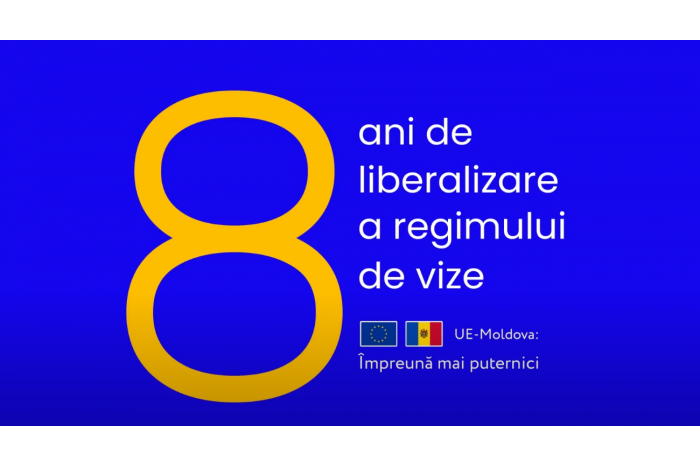Moldova marks eight years of visa-free travels of its citizens to Schengen Area
19:51 | 28.04.2022 Category: Official
Chisinau, 28 April /MOLDPRES/ - Moldova today marks eight years since the abolition of the visa regime for the short-stay travels of Moldova’s citizens holders of biometric passports to the Schengen Area. On the concerned period, 2,435,082 Moldovans benefited from the concerned regime, travelling to EU more than 10,500,000 times, the Foreign Affairs and European Integration Ministry’s (MAEIE) press service has reported.
On the period 2014-2019, each year of enforcement of the visa-free regime was marked by an ascendant dynamic; thus, the annual number of beneficiaries reached 157,816 people who travelled to the Schengen Area in 2014 up to 890,974 in 2019. At the same time, according to the European Border and Coast Guard Agency (Frontex), only 0.3-0.4 per cent of entrance refusals and 0.5-0.7 per cent of illegal stay cases out of the total number of travels were recorded. Therefore, the Moldovan citizens showed a responsible attitude towards this freedom.
In the context of the starting of the COVID-19 pandemic and the travel restrictions introduced by the European Union member states, the free movement was hit essentially. In 2020, the number of beneficiaries of the visa-free regime dropped 2.4-fold against 2019 (from 890, 974 to 366, 254) and the number of travellers – 2.9-fold (from 2, 322,787 to 793,243). In 2021, the situation gradually improved; yet, the number of beneficiaries of the visa-free regime remained 1.5-fold lower against 2019 (614,873 against 890,974) and the number of travellers – 1.8-fold lower (297, 528 in comparison with 2,322,787).
At the same time, the rate of the cases of entrance refusal and the ones of illegal stay increased disproportionally, reaching 1.1 per cent (8,668 cases) and, respectively, 2.6 per cent (20,414 cases) in 2020. In 2021, the rate of cases of entrance refusal dropped significantly to 0.6 per cent (7,798 cases) and the rate of illegal stay cases slightly increased up to 2.8 per cent (36,174 cases). The evolution of the rate of entrance refusal cases might be explained by the limiting, on certain periods, of travels to some Schengen Area countries exclusively to essential travels and by gradual giving up of the concerned limiting.
We voice confidence that the measures of managing COVID-19, including the vaccination campaigns, carried out both in Moldova and in the Schengen Area states, as well as the equalizing of the certificates issued in Moldova with the European Union’s COVID digital certificate in 2021 will allow, in a predictable future, to gradually give up the travel restrictions introduced in the context of the pandemic. Thus, it will become possible the full reestablishment of the benefits of the visa-free regime for the Moldovan citizens as regards the facilitation of the inter-human contacts and contribution to the additional strengthening of the business, social and cultural relations between Moldova and the Schengen Area countries.
MAEIE will continue informing the Moldovan citizens about the rights and obligations related to the visa-free regime, including with the help of the Guide on the free movement to the EU area.
Also, decision-makers will further publish information on the rules on access to other states in the context of COVID-19. At the same time, the national authorities will continue ensuring the implementation of the conditions which stayed at the basis of the visa regime’s liberalization, taking into account also the recommendations of the European Commission’s annual reports on the European Union’s Mechanism for the suspension of the visa-free regime.
The Schengen Area is made up of a) 26 out of 27 European Union member states, only Ireland represents an exception, as well as b) Switzerland, Iceland, Liechtenstein and Norway.
Photo: MAEIE

